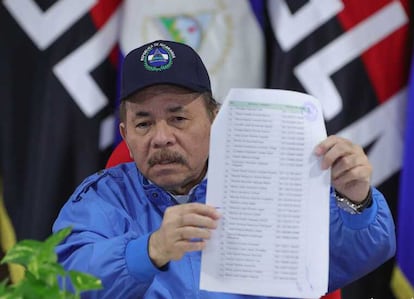Daniel Ortega: ‘No negotiation’ with US over release of political prisoners
The Nicaraguan leader said it was his wife and vice-president, Rosario Murillo, who contacted the US Embassy in Managua to request the transfer of 222 dissidents to Washington


Nicaraguan President Daniel Ortega has denied there was any direct negotiation with the United States following the release of 222 political prisoners, who were sent to Washington from the Central American country on Thursday. Ortega stated that it was in fact his wife, Rosario Murillo, who contacted the US Embassy in Managua to ask that the freed dissidents be allowed to leave the country. “I didn’t think there would be a positive response,” Ortega said. “It wasn’t about negotiating anything. That has to be clear. We’re not asking that they lift the sanctions. We aren’t asking for anything in return,” the Nicaraguan leader added in a press conference held on Thursday afternoon in Managua. “It is a matter of honor, dignity and patriotism.”
Washington has imposed several measures against the Ortega-Murillo regime, which include sanctions against the president’s family members - including Murillo herself and several of her children - and high-ranking government officials. “This is not a case of ‘I give you this and you give me that.’ These people are returning to a country that has used them … to sow terror, death and destruction here in Nicaragua,” Ortega said, adding that Washington should “take their mercenaries.”
During his press conference, Ortega was accompanied by senior state figures, among them the head of the Army, General Julio César Avilés, the president of the National Assembly, Gustavo Porras, and members of the National Police and the Supreme Court. Ortega described the released dissidents as “terrorists” financed by the United States to destabilize his government. The Nicaraguan leader also expressed his surprise at the US accepting the prisoners, whom he accused of “threatening sovereignty and peace” and of being “agents of foreign powers.” Ortega also claimed he had previously asked Washington to “take them away.”
According to Ortega’s account of events, the US Embassy in Managua consulted with Washington over the proposal. The embassy then asked for a list of the detainees and offered to charter a flight for their transfer to the US. It was Murillo who was in charge of collating and negotiating the list, said Ortega, which initially contained 228 names. According to the Nicaraguan president, there were four that Washington refused to accept. Two more elected not to board the flight: Fanor Alejandro Ramos and Bishop Rolando Álvarez.
Ortega revealed that US officials were particularly interested in securing the release of Bishop Álvarez, who was detained in August 2022 on charges of “conspiracy and spreading false news.” Once the two parties had agreed on the list of political prisoners, Washington sent an airplane to Managua. “We had agreed on silence, that nothing would leak out,” Ortega said. “It was an operation that had to be carried out with great discipline. They complied and we complied.”
Ortega aimed his criticism mainly at Bishop Álvarez, after he refused to go into exile. Ortega mockingly said that the prelate had displayed “the arrogant behavior of one who considers himself the head of the Church of Nicaragua, the leader of the Latin American Church.” He added that Álvarez, who is under house arrest, “has been treated in an incredible way, like no other prisoner in this country. I was in prison for seven years and I have never met a prisoner in history who was treated in such a way as this gentleman.” Ortega also confirmed that the bishop had been transferred to the notorious La Modelo prison “for not complying with the law.”
Ortega also took aim at the writer Sergio Ramírez, a winner of the Cervantes prize, whom he described as a “traitor” and a “mercenary” over an article published Thursday in EL PAÍS, in which Ramírez criticizes the former guerrilla fighter’s strategy. “The dictatorship has been left empty-handed. Its best strategy would have been to negotiate for the hostages in batches, and not to release them all at once, in order to keep their cards up their sleeves. It was a bad move, as far as they are concerned. And releasing them is not a proof of strength, but of weakness,” Ramírez wrote.
Sign up for our weekly newsletter to get more English-language news coverage from EL PAÍS USA Edition
Tu suscripción se está usando en otro dispositivo
¿Quieres añadir otro usuario a tu suscripción?
Si continúas leyendo en este dispositivo, no se podrá leer en el otro.
FlechaTu suscripción se está usando en otro dispositivo y solo puedes acceder a EL PAÍS desde un dispositivo a la vez.
Si quieres compartir tu cuenta, cambia tu suscripción a la modalidad Premium, así podrás añadir otro usuario. Cada uno accederá con su propia cuenta de email, lo que os permitirá personalizar vuestra experiencia en EL PAÍS.
¿Tienes una suscripción de empresa? Accede aquí para contratar más cuentas.
En el caso de no saber quién está usando tu cuenta, te recomendamos cambiar tu contraseña aquí.
Si decides continuar compartiendo tu cuenta, este mensaje se mostrará en tu dispositivo y en el de la otra persona que está usando tu cuenta de forma indefinida, afectando a tu experiencia de lectura. Puedes consultar aquí los términos y condiciones de la suscripción digital.








































